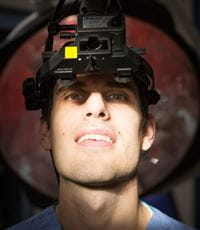Password Reset
Forgot your password? Enter the email address you used to create your account to initiate a password reset.
Forgot your password? Enter the email address you used to create your account to initiate a password reset.
4 Minutes
Retinitis pigmentosa (RP) slowly and irreversibly destroys the photoreceptors — rods and cones — in the retina, eventually depriving individuals of their vision. In end-stage RP, both rod and cone photoreceptors degenerate, while retinal ganglion cells (RGCs) that process information from photoreceptors may remain relatively preserved.
At present, once rod and cone photoreceptors are damaged, there is no way to restore their function. While ophthalmologic science cannot resuscitate an RP-damaged photoreceptor, there may be a workaround to restore light sensitivity to cells in the retina. Of interest to researchers is an approach involving optogenetic mediated transformation of RGCs into photo-responsive cells, which may confer vision restoration capabilities in severe visual impairment.
Researchers in the Department of Ophthalmology at the University of Pittsburgh School of Medicine and the UPMC Eye Center are pursuing optogenetics clinical research that may allow light sensitivity to be bestowed upon RGCs and other cell types in the retina, thereby bypassing the lost photoreceptors along the visual pathway. Researchers at UPMC and collaborators from London and Paris are in the midst of their first phase 1/2 trial of this approach.
The PIONEER optogenetic study is a first-in-human dose-escalation clinical trial enrolling patients with end-stage RP independent of the underlying genetic defect. The vision restoration approach combines optogenetic gene therapy and a stimulating medical device. The PIONEER phase I/IIa clinical trial (NCT03326336) began patient recruitment in September 2018 at three sites — UPMC Eye Center, Moorfields Eye Hospital NHS Foundation Trust in London, and the Centre Hospitalier National d’Ophtalmologie des Quinze-Vingts in Paris. Other sponsors and collaborators in the study include GenSight Biologics, Sorbonne Universités-UPMC-INSERM-CNRS, and the Foundation Rothschild (all located in Paris).
 Joseph Martel, MD, (left) assistant professor in the Department of Ophthalmology at the University of Pittsburgh School of Medicine, serves as the UPMC Eye Center site principal investigator (PI). Elise Boulanger-Scemama, MD, is the site PI at the Paris location, and Simona Esposti, MD, is leading efforts in London.
Joseph Martel, MD, (left) assistant professor in the Department of Ophthalmology at the University of Pittsburgh School of Medicine, serves as the UPMC Eye Center site principal investigator (PI). Elise Boulanger-Scemama, MD, is the site PI at the Paris location, and Simona Esposti, MD, is leading efforts in London.
The research team will attempt to confer light sensitivity upon retinal ganglion cells through a recombinant gene therapy utilizing an intravitreal injection of an engineered adeno-associated viral vector (AAV). The viral vector, in this case, is GS030-DP, which is an AAV2.7m8 vector engineered to contain the ChrimsonR-tdT gene. The gene expresses the ChrimsonR channelrhodopsin. This channelrhodopsin is sensitive to orange light in the 550-600 nanometer range.
After the injection and subsequent expression of the ChrimsonR gene in retinal ganglion cells, the participant wears a light stimulating device that encodes images of the visual field and projects those images onto the retina at an appropriate intensity and wavelength to stimulate the now light-sensitive retinal ganglion cells.
“ChrimsonR has a relatively low sensitivity to light so we cannot rely on the availability and intensity of the ambient light in the environment to stimulate the expressed opsins in the retinal ganglion cells, hence the need for the light amplification and the light stimulating device the participant wears,” says Dr. Martel.
The design of the PIONEER trial seeks to obtain safety and tolerability of the intravitreal injections of the AAV containing ChrimsonR in escalating doses in participants with end-stage, nonsyndromic RP.
Secondary endpoints of the study include measurements of functional vision, visual function, orientation and mobility, quality of life, and any immune responses in the participants.
“The research team has developed a battery of functional tests for our participants to assess their visual perception and function. The low vision rehabilitation team, led by Dr. Smith, trains patients on how to understand the visual perceptions and hopefully use their new visual capabilities,” says Dr. Martel.
Collaborators from the UPMC Eye Center and University of Pittsburgh School of Medicine Department of Ophthalmology on the PIONEER clinical trial and other retinal gene therapy research include:
Interested in receiving specialty-specific information? Register for UPMC Physician Resources to get emerging research, clinical updates, and free CME straight to your inbox.